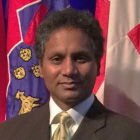In October, Akaash Maharaj FRSA spoke at the NATO Parliamentary Assembly in Norway, on what seemed like a distant question: drawing on the experience of Afghanistan, how should NATO conduct a future expeditionary campaign, which might be precipitated by an attack on one of its members? The November terrorist attacks on Paris have given those deliberations a terrible new urgency.
The lessons of Afghanistan were purchased at a bitter cost: the war claimed more lives, more years, and more money than any other campaign in NATO's history. Unless the alliance takes those lessons to heart, a war in Syria and Iraq to extinguish Daesh – the self-styled “Islamic State” – will be worse.
As I have argued elsewhere, the gravest mistake NATO made in Afghanistan was to confuse allies for friends, to believe that those who fought with us against the Taliban would be trustworthy partners in reconstruction of the country. Worse still were the efforts to appease those allies by allowing them free rein as they pillaged the state. Ultimately, the warlords of the Karzai regime were as much murderous fundamentalists as the Taliban, only greed was their god.
More broadly, NATO states confused having a common reason for war, with having a common objective in war. The alliance was certainly united in its conviction that the 2011 Al-Qaeda attack on the World Trade Centre demanded a military response. However, this clarity of impetus obscured deep differences in goals.
Was the objective of the war to deny Al-Qaeda use of Afghanistan as a base of operations for future attacks? Was it to destroy the Taliban? Was it to disrupt terrorist networks sprawling across borders? Was it to rescue the Afghan people from humanitarian catastrophe? Was it to satisfy a craving for justice? Was it to meet the minimum requirements of treaties and public sentiment?
At different stages of the campaign, different NATO governments embraced different ends, and it became increasingly difficult for the alliance’s citizens to recognise what “victory” would look like, and when it would be time to call their troops home.
After my address to the NATO Parliamentary Assembly, my colleague Senator Joëlle Garriaud-Maylam asked me to meet with her fellow legislators in France’s parliament. It was important to continue the discussion, so that if, at some point in the unforeseeable future, NATO states had to reply to an attack on one of its members, the alliance would be ready to take sober, considered decisions.
A few weeks later, 129 people lay dead in the streets of Paris. The future waits upon no one’s pleasure. The only question is whether we learn from the past.
In any military campaign against Daesh, how will we identify effective allies on the ground, who are less pernicious than our common enemy? How will we ensure that neither chaos nor tyranny fill the vacuum left after a successful campaign? Whom will Syrians be able to trust to rebuild their country?
States who opt to train the local resistance will face a difficult choice over equipping those fighters. Trained but unarmed, they would be of no use to anyone. Trained and armed, they may eventually turn their weapons against us, as the Taliban did after the war with the Soviet Union. States who opt to participate in a bombing campaign will have to set imponderable metrics, to assess their effectiveness in a war that no one believes can be won from the air.
States who opt to deploy ground troops will need to ask themselves how long their own populations will support the campaign, if Daesh continues to burn prisoners of war alive, as they did with the Jordanian pilot Muath al-Kasasbeh.
The most difficult question of all will be that of our ultimate objective. What does it mean to defeat an enemy that numbers in the tens of thousands, and that will stab at us while even one draws breath? How will a campaign in Syria and Iraq diminish Daesh attacks in the west, when European citizens have been the perpetrators? How can we be victorious against an enemy infatuated with martyrdom?
We can not come to an accommodation with an adversary whose purpose is our annihilation. We cannot use deterrence against an adversary that wants to die. We must destroy them, or be destroyed by them.
However, an effective military strategy requires more than just a willingness to unleash force; it also demands a genuine national consensus on long-term objectives, and on the human and financial costs that each state is willing to endure in pursuit of those objectives.
Civil society organisations like the RSA have a critical role to play in cultivating that consensus, by posing often-uncomfortable questions, fostering debate, and nurturing an environment of informed, dispassionate analysis. If history is any guide, once the drumbeats of war begin, political leaders acting on their own are rarely able to ensure that passion is the servant – and not the master – of reason.
Akaash Maharaj FRSA is Chief Executive Officer of the Global Organization of Parliamentarians Against Corruption (GOPAC). His personal web site is www.Maharaj.org
Related articles
-
All we are saying is give degrowth a chance
Chris Oestereich Sam Bliss
A decade ago, a container shipping worker had an epiphany, and it caused him to question the very basis of his business. Sam Bliss and Chris Oestereich take up the story.
-
Prioritising social value in supply chains
Aoise Keogan-Nooshabadi
The pandemic and the increase in extreme weather events has exposed the fragility of our global supply chains. Meanwhile, new Government procurement policy means a consideration of social value is no longer an optional extra for business. Aoise Keogan Nooshabadi, FRSA, looks at the ethical, practical and economic benefits of buying and supplying closer to home
-
Want to rebuild your life? First prove you’re alive
Lauren Anders Brown
War and forced migrations mean hundreds of thousands of displaced people lack the documents to find work, start a new life, or even prove they exist. Lauren Anders Brown, co-directed Forged, about the Syrian conflict. She argues that we desperately need a universal, non-governmental ID system




Be the first to write a comment
Comments
Please login to post a comment or reply
Don't have an account? Click here to register.